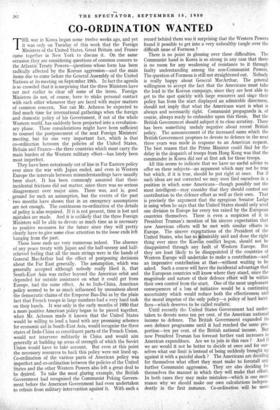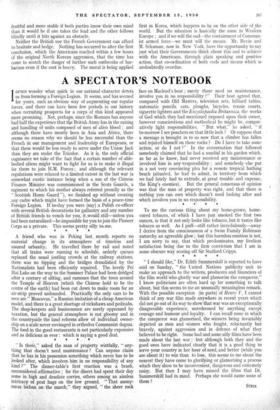CO-ORDINATION WANTED
THE war in Korea began some twelve weeks ago, and yet it was only on Tuesday of this week that the Foreign Ministers of the United States, Great Britain and France came together in New York to discuss it. On the same occasion ,they are considering questions of common concern to the Atlantia Treaty Powers—questions whose form has been radically affected by the Korean aggression—and the main items due to come before the General Assembly of the United Nations at its meeting on September 19th. In fact the agenda is so crowded that it is surprising that the three Ministers have not met earlier to clear off some of the items. Foreign Ministers do not, of course, have to Make personal contact with each other whenever they are faced with major matters of common concern. Nor can Mr. Acheson be expected to find much time for international gatherings when the foreign -and domestic policy of his Government, if not • of the whole" Western world, has suddenly been projected into a revolution- ary phase. These considerations might have been sufficient to counsel the postponement of the next Foreign Ministers' meeting, but for one very important fact, which is that co-ordination between the policies of the United States, Britain and France—the three countries which must carry the main burden of the Western military effort—has lately been most imperfect.
They have been notoriously out of line in Far Eastern policy ever since the war with Japan ended, and even in Western Europe the intervals between misunderstandings have usually been short. It has been commonly assumed that these incidental frictions did not matter, since there was no serious disagreement over major aims. There was, and is, good ground for such an assumption, but the events of the past ' two months have shown that in an emergency assumptions are not enough. The continuous co-ordination of the details of policy is also required. If it is not present, time is lost and *stakes are made. And it is unlikely that the three Foreign Ministers will be able to devote as much time as is necessary to positive measures for the future since they will pretty clearly have to give some close attention to the loose ends left hanging from the past.
Those loose ends are very numerous indeed. The absence of any peace treaty with Japan and the half-uneasy and half- relieved feeling that all the main strings were in the hands of General MacArthur had the effect of postponing decisions about the Far East generally. The assumption, which was generally accepted although nobody really liked it, that South-East Asia was rather beyond the American orbit and depended for outside assistance on what it could get from Europe, had the same effect. As to .Indo-China, American policy seemed to be as much influenced by uneasiness about the democratic claims of the Emperor Bao-Dai as by the plain fact that French troops in large numbers had a very hard task on theif hands. It was only in the early months of 1950 that a more positive American policy began to be pieced together, when Mr. Acheson made it known that the United States would be willing to lend a hand with any promising schemes for economic aid in South-East Asia, would recognise the three states of Indo-China as constituent parts of the French Union, would not intervene militarily in China and would aim generally at building up areas of strength of which the Soviet Union would have to take account. But even at this point the necessary resources to back this policy were not lined up. Co-ordination of the various parts of American policy was imperfect and co-ordination between the policies of the United States and the other Western Powers also left a great deal to be desired. To take the most glaring example, the British Government had recognised the Communist Peking Govern- ment before the American Government had even undertaken to refrain from military intervention against- it- With such a record behind them was it surprising that the Western Powers found it possible to get into a very, unhealthy tangle over the difficult issue of Formosa ?
There is no point in glossing over these difficulties. The Communist hand in Korea is so strong in any case that there is no room for any weakening of resistance to it through faulty understanding among the non-Communist Powers. The question of Formosa is still not straightened out. Nobody is really happy about General MacArthur. The general willingness to accept the fact that the Americans must take the lead in-the Korean campaign, since they are best able to get to the spot quickly with large resources and since their policy has from the start displayed an admirable directness, should not imply that what the Americans want is what is always and necessarily right. Communist propaganda is, of course, always ready to embroider upon this thesis. But the British Government should subject it to close scrutiny. There has been something unduly negative about recent British policy. The announcement of the increased sums which the British Government propt5ses to devote to defence in the next three years was made in response to an American request. The best reason that the Prime Minister could find for the delay in the despatch of troops from Hong Kong was that the commander in Korea did not at first ask for those troops.
All this seems to indicate that we have no useful advice to offer on these subjects—an argument which may not be true but which, if it is true, should be put right at once. For if such ideas are not corrected we may soorOfind ourselves in a position in which some Americans—though possibly not the most intelligent—may consider that they should control our contribution to the defence effort as well as their own. That is precisely the argument that the egregious Senator Lodge is using when he says that the United States should only send one division to Europe for every ten raised by the European countries themselves. There is even a suspicion of it in President Truman's mention of his sincere expectation that new American efforts will be met with similar efforts in Europe. The sincere exp tations of the President of the United States, who has so lniirably said and done the right thing ever since the Koren conflict began, should not be disappointed through any fault of Western Europe. But they are least likely to be disappointed if the countries of Western Europe will undertake to make a contribution—and an impressive contribution at that—without waiting to be asked. Such a course will have the incidental advantage that' the European countries will know where they stand, since the magnitude and nature of their defence effort will be within their own control from the start. One of the most unpleasant consequences of a loss of initiative would be a continuing nncertainty which would reduce both the effectiveness and the moral impetus of the only policy—a policy of hard kacri- fices—which deserves to be called realistic.
-Until recently the United States Government had under- taken to devote some ten per cent. of the American national income to defence. The British Government expanded its own defence programme until it had reached the same pro- portion—ten per cent. of the British national income. But now President Truman has forecast further vast increases in American expenditure. Are we to join fit this race ? And if we are would it not be better to decide at once and for our- selves what our limit is instead of being suddenly brought up against it with a painful shock ? The Americans are deciding for themselves what effort they must make to forestall any further Communist aggression. They are also deciding for themselves the manner in which they will make that effort. In both cases they may make mistakes—which is one more reason why we should make our own calculations Indepen- dently in the firSt instance. Co-ordination will be more fruitful and more stable if both parties know their own mind than it would be if one takes the lead and the other follows blindly until it hits against an obstacle.
Neither the British nor the French Government can afford to hesitate and hedge. Nothing has occurred to alter the first conclusion, which the Americans reached within a few hours of the original North Korean aggression, that the time has come to scotch the danger of further such outbreaks of bar- barism even if the cost is heavy. The moral is being applied first in Korea, which happens to be on the other side of the world. But the situation is ,basically the same in Western Europe ; and if we will the end—the containment of Commun- ist armed force—we must will the means. Mr. Bevin and M. Schuman, now in New York, have the opportunity to say just what their Governments think about this and to achieve with the Americans, through plain speaking and positive action, that co-ordination of both ends and means which is undoubtedly overdue.























 Previous page
Previous page